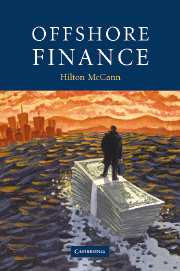Book contents
- Frontmatter
- Contents
- List of figures
- List of tables
- Preface
- List of abbreviations
- PART I The past
- PART II The present
- 10 Supranational focus (1): the Financial Stability Forum and the International Monetary Fund
- 11 Supranational focus (2): the Financial Action Task Force
- 12 Supranational focus (3): the Organization for Economic Cooperation and Development
- PART III The future
- Appendix 1
- Appendix 2
- Index
10 - Supranational focus (1): the Financial Stability Forum and the International Monetary Fund
from PART II - The present
Published online by Cambridge University Press: 21 August 2009
- Frontmatter
- Contents
- List of figures
- List of tables
- Preface
- List of abbreviations
- PART I The past
- PART II The present
- 10 Supranational focus (1): the Financial Stability Forum and the International Monetary Fund
- 11 Supranational focus (2): the Financial Action Task Force
- 12 Supranational focus (3): the Organization for Economic Cooperation and Development
- PART III The future
- Appendix 1
- Appendix 2
- Index
Summary
Outcomes matter, but no more than the fairness of the processes that produce them.
Introduction
For the past ten years, the ‘Offshore’ industry has been constantly under fire with claims that it was facilitating the laundering the proceeds of drugs trafficking and other offences.
This chapter and the next two describe work carried out in respect of the ‘Offshore’ environment by some supranational organisations: the Financial Stability Forum (FSF), the International Monetary Fund (IMF), the World Bank, the Financial Action Task Force (FATF) and the Organization for Economic Cooperation and Development (OECD).
This particular chapter focuses on the work of the Financial Stability Forum (FSF), and on the International Monetary Fund (IMF) and the World Bank, beginning with the FSF. The FSF itself has been described in Chapter 9, so the outline that follows merely serves to place the work of the FSF in respect of ‘Offshore’ in context.
The work of the Financial Stability Forum
With reference to its work on ‘Offshore’ in particular, ‘the objective of the FSF's OFC initiative is to strengthen the supervisory, regulatory information sharing and international cooperation practices of OFCs on a lasting basis’. At its inaugural meeting on 14 April 1999, the FSF created a Working Group on ‘Offshore Finance Centres’. The Working Group was asked to:
consider the uses of OFCs and the possible role they have had or could play in posing threats to the stability of the financial system;
evaluate the adherence of OFCs with internationally accepted standards and good practices; and
[…]
- Type
- Chapter
- Information
- Offshore Finance , pp. 261 - 286Publisher: Cambridge University PressPrint publication year: 2006



